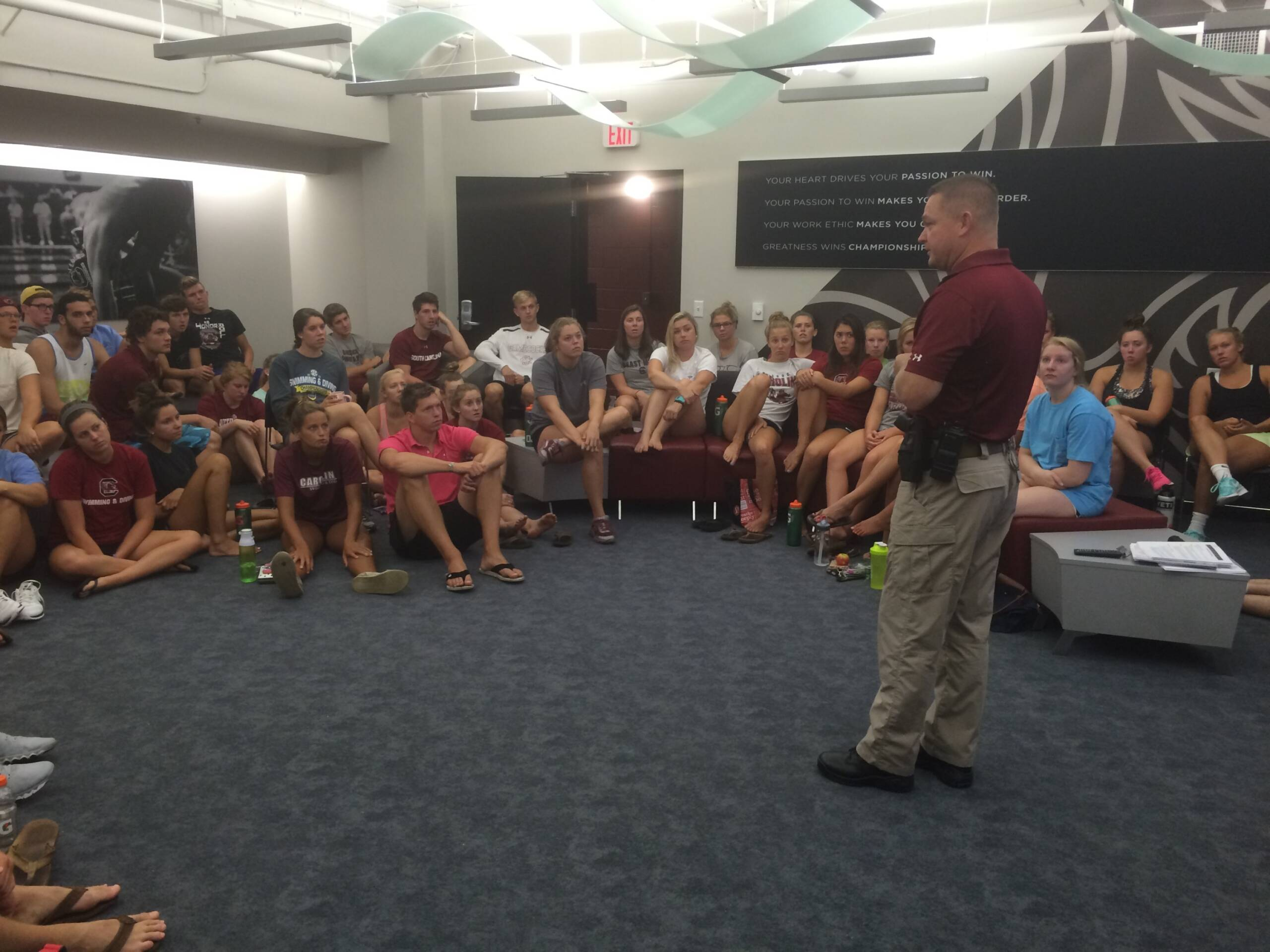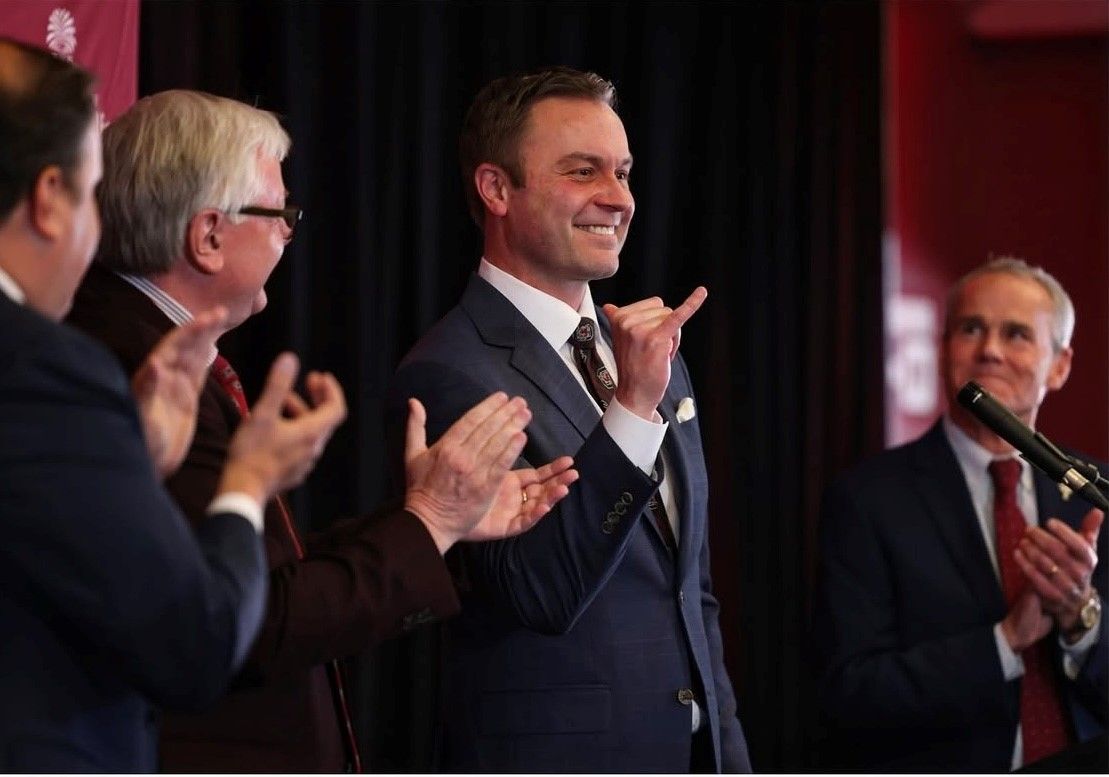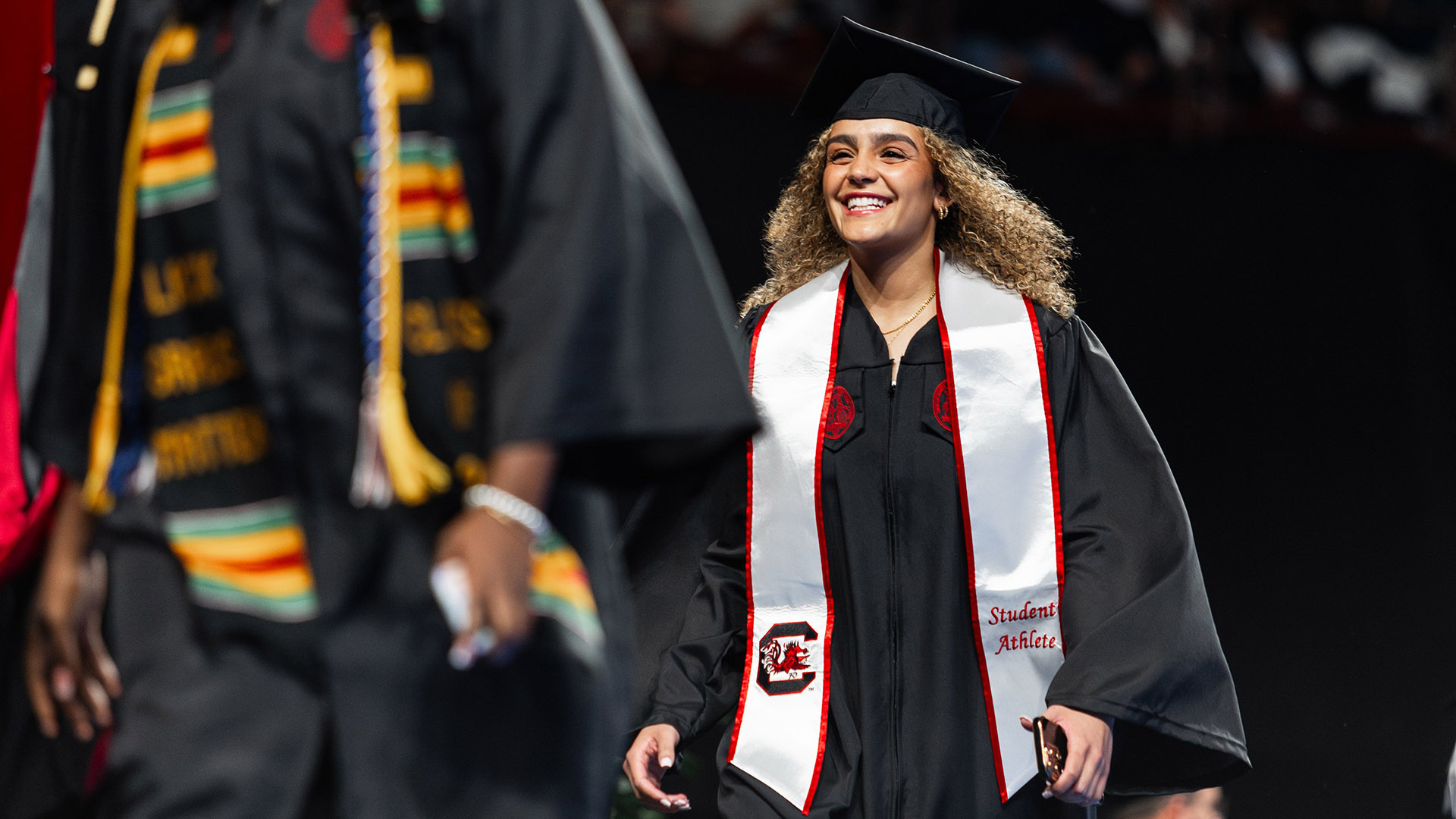
Gamecocks Get Education on Personal Safety
Aug. 26, 2015

Looking out for the well-being of South Carolina student-athletes extends beyond medical and psychological care by physicians and athletics trainers. The Gamecocks are also being educated about personal safety as it relates to what they put out on social media as well as their interactions with fans and the public. Major Jim Miles with the University of South Carolina Division of Law Enforcement and Safety is bringing that message home with presentations on personal safety to the individual Gamecock teams.
“The main message that I’m trying to get out to the student-athletes is that because they are exceptional in what they do, they are easy to be seen and found,” Miles said. “Because of that focal point, they need to go the extra mile to protect themselves from people who want to latch on to them for financial gain or for emotional needs, which may lead to stalking and harassment.”
This is the second year in a row that Miles, who has a long career as an investigator with a specialty in human behavior, has been asked to speak to the teams. Miles has 26 years of law enforcement experience in South Carolina having also worked with or assigned to several state agencies, and he is also a veteran of the United States Navy. He is a polygraph examiner and has lectured on physical and language responses to stress and deception.
Miles was originally asked to come to speak to the volleyball team last year due to concerns about the behavior of a few fans towards the volleyball students. Miles helped the student-athletes learn how to better protect themselves from becoming targets of overzealous or inappropriate fan behavior, including sexual harassment and stalking.
“This is extremely important because a lot of times our student-athletes don’t think about the details that go on outside of their sport as it pertains to their own safety,” said McGee Moody, head swimming and diving coach. “It’s easy to think that because you excel in your sport that you are invincible. His presentation brought to light a lot of things they don’t think about on an everyday basis. What those men and women do for us to keep our student-athletes safe goes unrecognized a lot of the time because they’re doing their job well.”
Citing real life examples involving incidents from South Carolina and other campuses around the country, Miles covered topics including safety with social media, abusive relationships, stalkers, and looking for behavioral warning signs and clues to mental health issues.
“It made me really aware of the importance of keeping things private on social media” said Taylor Vincent, a junior on the women’s swim team. “It was surprising to see how dangerous it can be. Something as simple as being careful with what you’re wearing in pictures that you post can be important.”
“I look for things that should be alarming to you,” Miles told the swim team recently. “I’m not here to scare you. I’m here to tell you that this is the world I deal in. I’m here to tell you to be very careful in what you put out there.”
Miles starts his class with some humor, but then quickly provides real life examples of how things can take a dangerous turn.
“I try to be as timely as possible,” Miles said. “That can be an unfortunate thing because that means there has been something that happened recently that they are familiar with. It’s important to tell a teammate, or tell a coach, or tell the police when you’ve got something going on. I can show examples where someone has died because they didn’t tell anybody or they tried to hide it and told people not to call the police. There is no better way to teach somebody than through true history that they can identify with. I talk about things that have happened in the last 12 months.”
The main message that I’m trying to get out to the student-athletes is that because they are exceptional in what they do, they are easy to be seen and found. Because of that focal point, they need to go the extra mile to protect themselves.
Major Jim Miles
Because student-athletes often come into close contact with fans, Miles talked about appropriate and inappropriate fan behavior, how to set reasonable barriers with fans, preventive measures, and he stressed the importance of communications with coaches, teammates and legal authorities when something doesn’t feel right.
“You always think that something bad won’t happen to you or it won’t happen at your university,” said Travis Morrin, a redshirt sophomore on the men’s swim team. “It’s interesting to hear stories from other student-athletes who have gone through something like this, so it really hits close to home and opens your eyes.”
Similar to the education received from the Athletics Department as well as in the new SPTE 490 Student-Athlete Experience class, which is mandatory for freshmen and transfers, Miles explains how damage can be done through one post on social media by citing examples of mistakes he’s seen on some of the current student-athletes personal pages.
“I never say their names in the presentation, but I can look around the room and see the uncomfortable looks on their faces that somebody knows I’ve picked them out,” Miles said. “Usually it’s freshmen with things they posted in high school. A lot of times they don’t realize that now they are a national figure.”
“I realized that I’ve done some of the stuff he talked about in terms of posting personal information, and now I know that other people can get access to all of that in terms of where I live, where my parents live and things like that,” Morrin said. “As social media evolves and gets more advanced, so do the stalkers who can come after you, so you have to stay one step ahead. It’s great that the university has people like Major Miles come to speak to us to keep us updated on what we can do to protect ourselves.”
Miles wants to make it clear that there is nothing wrong with natural interactions between student-athletes and fans, but due to their accessibility, it can be up to the student-athletes to decide when to put up barriers.
“Fans want to take a selfie with student-athletes and ask for autographs, and that’s fine,” Miles said. “Especially if they are age appropriate. It’s the ones that always seem to single out a team, and from that team they seem to single out one or two players over and over and they take it to uncomfortable levels where they suddenly think they are very close to you personally. A lot of it is about that unusual behavior where they reach out and grab you or something like that. You have to notify someone when it happens.”
Miles also noted that inappropriate behavior is exhibited toward female and male student-athletes alike.
“There are certain sports where I spend a lot of time talking about stalkers who are there strictly for financial gain,” Miles said. “They’ll come at you wanting to take pictures with you holding a shoe or an article of clothing or some other product. All of the sudden, you’re promoting that product and you didn’t even realize it. This person puts it out there as if you are part of it, and they are getting financial gain.”
“When he mentioned there are only a few hundred of us (student-athletes) on a campus of over 30,000 people, it makes you realize you’re part of something special,” Vincent said. “We have great fans, but there are different kinds of people out there, and I realized there are things we have to take seriously.”












